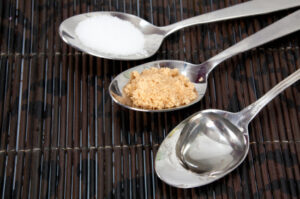
The sweet stuff, whether we’re aware of it or not, plays a fairly significant role in our everyday diet, largely due to the plethora of pre-packaged and processed foods available on the shelves today.
With research indicating that trying to keep tabs on the amount of added sugar we eat is a good idea for general health, wellbeing and weight loss, talk has turned to sugar substitutes or alternatives.
These products do the same thing as sugar, but usually have less calories. Initially, products like splenda or equal were the beginning and end of the range on offer, but increasing public concern about sugar and sugar alternatives has led to an explosion in the market with new sweeteners being added almost constantly (at least that’s how it feels!).
All sugar substitutes are not created equal however, with products ranging from the good right through to the best avoided.Here we take a look at some of the most common and the ones to look out for in your supermarket (plus the ones to leave firmly on the shelf).
Common sugar substitutes
- Equal – Popping an equal tablet became a tell-tale sign of someone trying to lose weight a few years back. The official name for this sweetener is aspartame and, as the name suggests, it’s largely a chemical or artificial compound, 200 times sweeter than sugar. Artificial sweeteners like aspartame have been getting a lot of press lately due to some of the rather dubious effects they can have on our bodies. You can read more about that here, but, generally speaking, we recommend avoiding this category.
- Splenda – Splenda or sucralose is another products that falls under the ‘artificial sweetener’ banner. 600 times sweeter than white sugar, this product is calorie free and a popular choice for various food and beverages. Similar to Equal, sweeteners like Splenda have been in the spotlight recently. Choosing a natural alternative is generally advised.
- Stevia – Stevia is a natural sweetener derived from the stevia plant and is 300 times sweeter than sugar. Found in both powder and liquid form, stevia is often used in baking or to replace sugar in foods that require some sweetness. With 0 calories to its name, stevia can be a good alternative to pure sugar but as with any food, eating too much of it or relying on the fact that it is calorie free isn’t going to help your weight loss. Certain brands can also contain other ingredients, alongside the stevia herb so it’s always best to check. Great stevia blends for cooking with include the very popular Nativa brand.
- Agave nectar or syrup – A newer face in the market, agave nectar or syrup comes from the agave plant and is similar in consistency and taste to honey. The biggest selling point for this natural sweetener is its low GI score, along with the fact that it’s usually purchased in its natural state; unprocessed and ‘raw’, which makes it a popular option for those who follow a raw food diet. Agave is mostly fructose (between 70%-90%) and has a similar calorie count to honey or maple syrup.
- Xylitol – The name may sound like a chemical, but xylitol is actually another naturally occurring sweetener. Found naturally in fibrous fruits, xylitol has less calories than sugar and a lower GI meaning that it doesn’t cause a spike in our blood sugar levels. This is one of the reasons that xylitol is a popular choice for diabetics. It’s a little more difficult to come by but can usually be found in its crystallised form in health food shops or online.
